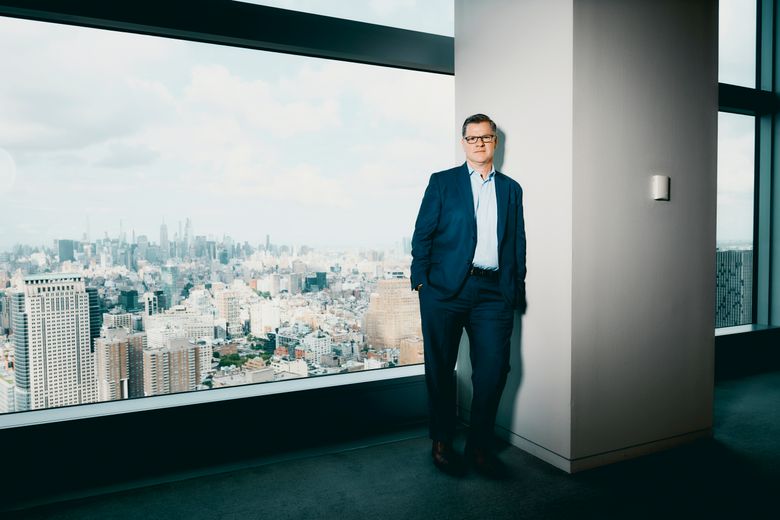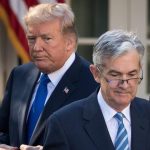 As Jim Covello’s car barreled up Highway 101 from San Jose to San Francisco this month, he counted the billboards about artificial intelligence. The nearly 40 signs he passed, including one that promoted something called Writer Enterprise AI and another for Speech AI, were fresh evidence, he thought, of an economic bubble.
As Jim Covello’s car barreled up Highway 101 from San Jose to San Francisco this month, he counted the billboards about artificial intelligence. The nearly 40 signs he passed, including one that promoted something called Writer Enterprise AI and another for Speech AI, were fresh evidence, he thought, of an economic bubble.
“Not that long ago, they were all crypto,” Covello said of the billboards. “And now they’re all AI.”
Covello, the head of stock research at Goldman Sachs, has become Wall Street’s leading AI skeptic. Three months ago, he jolted markets with a research paper that challenged whether businesses would see a sufficient return on what by some estimates could be $1 trillion in AI spending in the coming years. He said that generative artificial intelligence, which can summarize text and write software code, makes so many mistakes that it was questionable whether it would ever reliably solve complex problems.
The Goldman paper landed days after a partner at Sequoia Capital, a venture firm, raised similar questions in a blog post about AI. Their skepticism marked a turning point for AI-related stocks, leading to a reassessment of Wall Street’s hottest trade.
Goldman’s basket of AI stocks, which is managed by a separate arm of the firm and includes Nvidia, Microsoft, Apple, Alphabet, Amazon, Meta and Oracle, has declined 7% from its peak on July 10, as investors and business leaders debate whether AI can justify its staggering costs.
The pause has come early in the AI arms race. The tech industry has a history of spending big to deliver technology transitions, as it did during the personal computer and internet revolutions. Those build outs spanned five years or more before there was a reckoning.
But Covello, 51, has experience with tech booms and busts. He followed the bursting of the dot-com bubble as a semiconductor analyst and was scarred by watching colleagues lose their jobs. More recently, the Goldman veteran joined an internal team that has been evaluating AI services for the firm to use. He said the services he reviewed were costly, cumbersome and not “smart enough to make employees smarter.”
The industry’s history has led some people to say that Covello’s call for caution is premature. Shortly after Goldman’s paper was published, George Lee, co-head of the firm’s geopolitical advisory business, challenged Covello in an email, saying that AI was poised to save workers time and improve their productivity. Lee urged him to be patient.
“The long-term impact of platform shifts is that applications emerge over time as that technology is refined, made more readily available, made cheaper,” Lee said in an interview, speaking about the email.
Goldman’s clients asked to hear more. At their request, the firm began hosting private bull-and-bear debates with Lee, as the bull, outlining his optimism about AI, and Covello, as the bear, explaining his pessimism.
The conversation was overdue, said Jim Morrow, CEO of Callodine Group, a Boston-based client of Goldman. “AI had captured the market zeitgeist,” he said. “Having someone from a firm like Goldman ring the bell and say, ‘Hey, it won’t become a reality the way everyone thinks’ had people asking important questions about what was actually happening.”
Covello was born to be a skeptic. Before he left for Georgetown University, where he would become the first person from his Philadelphia family to go to college, his father questioned him about whether a four-year degree could ever justify its cost. Then, as a first baseman on the university’s baseball team, he used that same skeptical eye in the batter’s box while averaging a respectable .270 at the plate.
In 2000, he joined Goldman Sachs as tech analyst. That summer, the firm gathered at a vineyard in Napa Valley for an enthusiastic company meeting about the tech industry. But the internet boom, which had already crested, began to crash in the months that followed.
A few companies like Google and Amazon survived and became fabulously wealthy, but Covello fixated on the carnage. “It was a very scary time,” he said. “I didn’t know if I was still going to have a job.”
Covello kept his job. At the time, Goldman was reducing its costs by replacing experienced analysts with younger employees. It promoted Covello to be its lead semiconductor analyst in 2001 and elevated him to be the head of global equity research in 2021.
After the release of ChatGPT in 2022, the tech industry started comparing AI’s arrival to the dawn of the public internet. The comparison caught Covello’s attention. “That’s not what anybody should be rooting for,” he said, recalling the millions of jobs that were lost.
To create AI businesses, experts predicted $1 trillion would be spent on data centers, utilities and applications. Covello thought those costs made it impossible for the industry to inexpensively solve real-world problems, which is what internet companies did decades ago.
As a member of Goldman’s internal working group on AI, he reviewed a service that used generative AI to automatically update analysts’ spreadsheets with companies’ financial results. He said it saved his analysts about 20 minutes of time per company but cost six times as much money.
Word of Covello’s skepticism spread at the firm. Allison Nathan, who edits a monthly research report called “Top of Mind,” was planning an issue on AI. On a colleague’s recommendation, she met with Covello.
“For about 35 minutes, I was transfixed with his narrative and his views,” she said.
Nathan decided to interview Covello for the report. The conversation helped frame the 31-page report’s title: “Gen AI: Too Much Spend, Too Little Benefit?”











